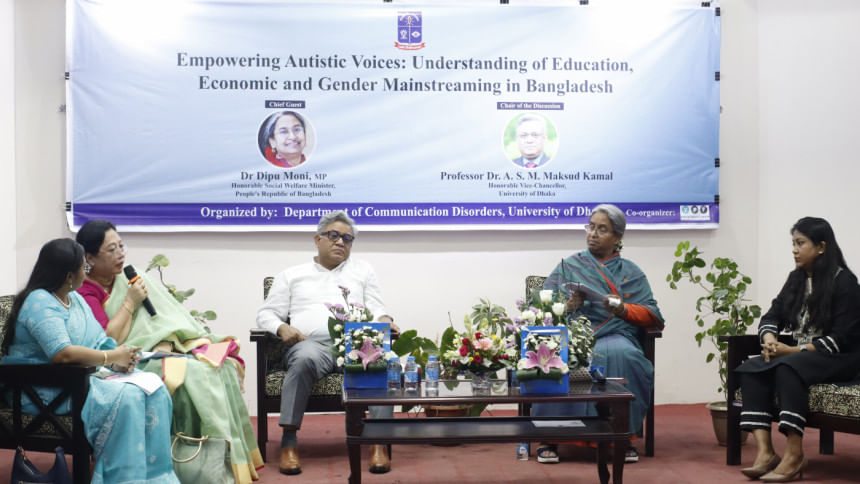Autism awareness in conversation

On April 29, the Gender & Inclusion team of the Youth Policy Forum (YPF) and the Healthcare Policy Network collaborated with the Department of Communication Disorders at Dhaka University to convene a session focused on driving positive change for autism awareness. The event featured Dr Dipu Moni, the Social Welfare Minister, as the chief guest, and Prof. Dr ASM Maksud Kamal, the Vice-Chancellor of Dhaka University, serving as the chair of the discussion. Alongside a diverse panel of experts, they explored various dimensions of empowerment, spanning education, economics, and gender mainstreaming
Hakim Arif, the founding chairman of Communication Disorders at Dhaka University, initiated the conversation by shedding light on a pressing issue: the challenges faced by individuals with autism in accessing employment opportunities due to societal stigma and other unique hurdles. He emphasised the communication barriers that individuals with autism may encounter, contrasting their experiences with those of individuals with physical disabilities. Drawing parallels with successful initiatives in other countries, Arif emphasised the importance of not only listening to the voices of individuals with autism but also to empower them.
Dr Atiur Rahman, Professor Emeritus at Dhaka University and Former Governor of Bangladesh Bank, spoke about the urgency of addressing autism within the ministry, particularly during budget allocations. He advocated for improved diagnosis metrics to accurately ascertain the number of neurodivergent individuals. Furthermore, he called for a paradigm shift in societal attitudes, urging for autism to be perceived not as a barrier but as a different ability. He also urged governmental support through funding initiatives and collaborative efforts with autism welfare organisations to promote entrepreneurship and establish inclusive platforms for autistic individuals in mainstream settings.
Subarna Chakma, as the Chairperson of Society for the Welfare of Autistic Children and a mother of a 33-year-old nonverbal son with autism, highlighted the crucial need to raise awareness among these individuals about their rights, recognizing that they may lack the ability to advocate for themselves. She emphasised the significance of safeguarding their inherent rights, urging government organisations like the NDD Trust to play a pivotal role in this endeavour. She also advocated for the economic empowerment of individuals with autism as a primary objective and emphasised the importance of nurturing their innate talents and rights, advocating for distinct recognition of autism and other disabilities within governmental organisations.
Afsana Sadiq Atuly, Country Lead of EdTech Hub and Youth Policy Forum Fellow for Education and Employment, raised important questions regarding the educational landscape for individuals with autism, advocating for inclusive education models and comprehensive teacher training programs to cultivate supportive classroom environments.
Sharmin Ahmed, the chairperson of Communication Disorders and the event's moderator, proposed practical solutions such as health screenings in kindergarten schools and inclusive education training for primary teachers to ensure early identification and support for children with autism.
Dr Dipu Moni acknowledged the need for improved organisation and coordination within ministries to enhance services for autism. She cited successful awareness campaigns spearheaded by individuals like Saima Wazed and underscored the government's commitment to mainstream education for all children, with plans to establish institutions and standardised tools for early autism diagnosis and care.
Dr ASM Maksud Kamal emphasised the importance of infrastructure and support within academic institutions, revealing plans to establish a dedicated school for children with autism within the university system. He stressed the significance of research and collaboration in developing tailored interventions and support systems for these individuals.
The event culminated in a resounding call to action, urging stakeholders at all levels to collaborate in creating an inclusive society where the voices of autism are not only heard but empowered. Towards the closing of the event, the panel spoke of the importance of not viewing autism solely through a deficit-based lens and instead embrace a strength-based approach that celebrates the talents and contributions of individuals with autism to pave the way for envisioning a more inclusive and compassionate Bangladesh.

 For all latest news, follow The Daily Star's Google News channel.
For all latest news, follow The Daily Star's Google News channel. 



Comments